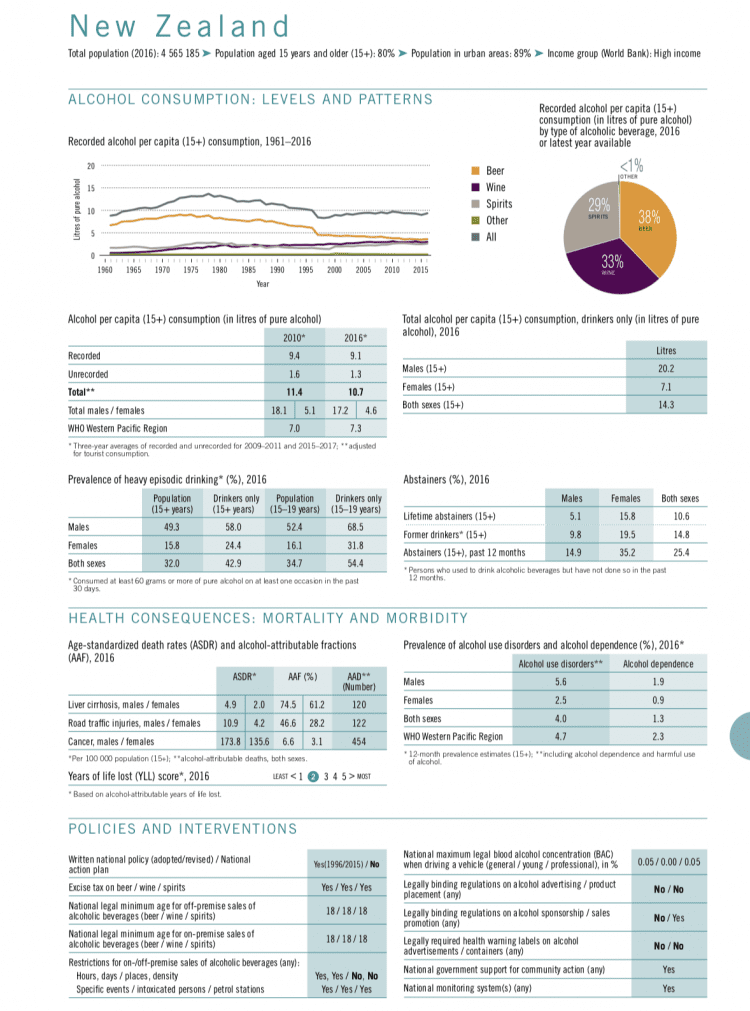New Zealand: 10 Year Government Alcohol Policy Failure
It is 10 years since the New Zealand Law Commission reviewed the alcohol laws in New Zealand. Yet the recommendations from the review have been ignored by successive governments over the decade.
The main recommendations of the review were dismissed by John Key’s National-led government at the time. Then the recommendations from two follow-up reports on marketing and pricing were dismissed by the next John Key-led government.
More recently, Jacinda Ardern’s Labour-led government has failed to commit to a recommendation from the Mental Health & Addiction Inquiry to strengthen alcohol regulations.
This 10 year government alcohol policy failure has led to drastic effects for New Zealand. Over the past 10 years, alcohol resulted in,
- 8000 premature deaths,
- 700,000 physical and sexual assaults,
- up to 30,000 children born with alcohol-related brain damage,
- social costs over $70 billion.
Further for police, alcohol has a way of trickling into almost every frontline job, from violence and sexual assault cases to driving under the influence and burglary.
According to Alcohol Action NZ, the only substantial change in alcohol regulations in this time have been reductions in the legal driving limits to a zero alcohol limit for drivers under the age of 20, and 0.05 for drivers over 20 years of age.
The big ‘winners’ from the continuation of the damaging [alcohol] culture of New Zealand are alcohol businesses, many of which are multinational companies” said Dr Geoff Robinson, Chair of Alcohol Action NZ, as per The Daily Blog.
State of the alcohol laws in NZ
The 2010 Law Commission report, ‘Alcohol in Our Lives: Curbing the Harm’, laid out 153 recommendations for reducing the harm of alcohol on society, with then-commissioner Sir Geoffrey Palmer spearheading the push for reform.
An initial surge in interest from the National-led government saw watered down legislation passed in 2012, as the Sale and Supply of Alcohol Act, which contained virtually no effective reform.
Key Law Commission policy recommendations included:
- The introduction of a new Alcohol Harm Reduction Act,
- Raising the price of alcohol by an average of 10% through excise tax increases,
- Regulating irresponsible promotions that encourage excessive consumption, or purchase, of alcohol,
- Returning the minimum purchase age for alcohol to 20,
- Strengthening the rights and responsibilities of parents for the supply of alcohol to minors,
- Introducing national maximum closing hours for both on and off-licences (4am and 10pm respectively),
- Increasing the ability of local people to influence how and where alcohol is sold in their communities,
- Increasing personal responsibility for unacceptable or harmful behaviours induced by alcohol, including a civil cost recovery regime for those picked up by the police when grossly intoxicated,
- Moving over time to regulate alcohol advertising and sponsorship.
Moving forward – urgent action needed to curb alcohol harm
Sir Geoffrey Palmer believes four of the 2010 recommendations could still have a huge impact in reducing alcohol harm: raising the age of purchase to 20-years-old; regulating advertising and sponsorship; raising prices; and introducing an excise tax.
Main causes of the increase in alcohol harm in the country are cheap alcohol and increased advertising.
It’s been five years since a 178-page Justice Ministry review found that a minimum alcohol price rise of $1 per standard drink could save the nation $318m in alcohol harm over a decade.
The ministry chose to hold-off introducing a minimum price for five years, in order to see how Local Alcohol Policies bedded-in. However, local policy has been failing.
Alcohol Healthwatch executive director Nicki Jackson said that within those five years there had been significant increases in alcohol harm and there was an urgent need to revisit the proposal.
In 2014 the Ministerial Forum on Alcohol Advertising and Sponsorship recommended banning alcohol sponsorship and advertising at all sports, sports broadcasting and cultural and music events where 10% of the audience was under 18.
For the past five years nothing has come of those recommendations either. People and specifically children are still exposed to alcohol ads.
Alcohol policy and harm in New Zealand
Latest data from the WHO Global Alcohol Status report shows that per capita alcohol use among consumers is very high in New Zealand. Almost 45% of all alcohol consumers also engage in heavy episodic alcohol use. And more than half of all young people consuming alcohol are engaging in binge alcohol use. Alcohol is also fueling liver disease and cancer in New Zealand.
As the overview shows, New Zealand lacks a national action plan to address alcohol harm. In addition, there gaps in the WHO-recommended three best buys in alcohol policy: pricing measures, availability regulations and alcohol marketing restrictions.
It is evident that the New Zealand government needs to take immediate action in the interest of public health to curb alcohol harm and create safer places for all and specially children.
